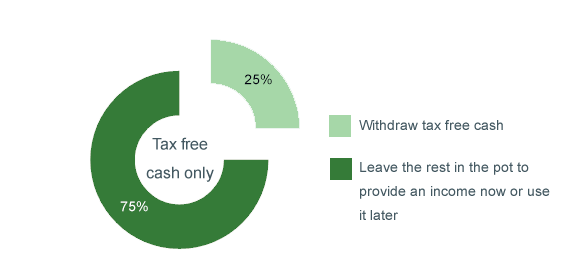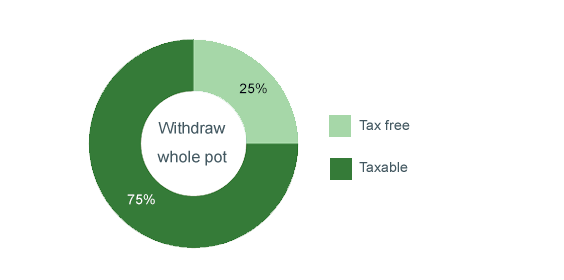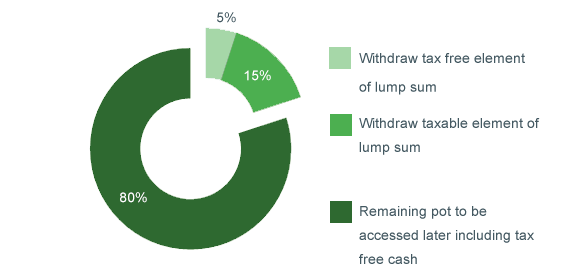When can I access my SIPP?
The minimum SIPP pension age is currently 55, but the age from which you can access your pensions will rise to 57 in 2028.
If you reach the minimum SIPP withdrawal age and don’t need to access it yet, you can leave your SIPP invested and growing free of tax. But if you are looking to access your pension for the first time, the SIPP withdrawal rules give you plenty of flexibility. You don’t have to use all your pension fund in one go, so you can choose one option for a SIPP withdrawal now and decide upon the rest later.
The main options are:
- Tax-free cash and SIPP drawdown– where up to 25% of the SIPP is paid as a tax-free lump sum and the rest stays invested in your SIPP. You can use the drawdown fund to give you a flexible income on a regular basis or as and when you need it.
- Pension lump sums – a single payment where 25% is tax free and the remaining 75% is taxable. You can use this option to take all of your pension at once, or take a series of smaller amounts and leave the rest invested and access more of it in the future.
- Tax-free cash and annuity – where up to 25% of the SIPP is paid as a tax-free lump sum and the rest of the fund is given to an insurance company to pay you a guaranteed income for the rest of your life.

Whole pot

Smaller amount


The government's Pension Wise service offers free, impartial guidance to help you understand the options at retirement.
You can make an appointment to speak to a Pension Wise specialist online or by telephone on either 0800 138 3944, or +44 20 3733 3495 if you live outside the UK.
Guidance or the information on this page is not a personal recommendation. If you need advice on which option is best for you then you should contact a regulated financial adviser.
Can I take money out of a SIPP before age 55?
The earliest SIPP access age is normally age 55.
There are exceptions, though – if you’re in ill health and can’t work, or if you’ve inherited a pension from someone who has died.
Do I pay tax on SIPP withdrawals?
Drawdown income
After taking up to 25% tax-free cash, you can choose to keep the rest of your fund invested by going into drawdown. When you want to take any income, we will deduct income tax from the SIPP withdrawal.
The SIPP withdrawal rules mean that it’s likely that an emergency tax code will be used on your first drawdown income payment. You’ll need to reclaim any overpaid tax directly from HMRC.
If you have other taxable income, it’s possible that your drawdown income pushes you into a higher-rate tax band – meaning you may end up paying more tax on the withdrawal than you thought.
Annuity income
After 25% tax-free cash, your remaining fund will be paid to your chosen annuity provider in exchange for a guaranteed income for life. The annuity provider (an insurance company) will deduct tax from your regular income payments.
Pension lump sums
25% of each lump sum you take is tax free, and the rest is taxed as income.
If you take a pension lump sum from your SIPP, we will deduct tax. If this is the first withdrawal from your fund, it's likely that an emergency tax code will be used. You’ll need to reclaim any overpaid tax directly from HMRC.
If you have other sources of taxable income, it's possible that the lump sum might push you into a higher tax band and you may end up paying more tax on the withdrawal than you thought.
Learn more about tax on SIPP withdrawals and emergency tax codes
Future pension contributions
Taking drawdown income or a pension lump sum will trigger something called the money purchase annual allowance (MPAA).
This will the tax benefits of any contributions to your SIPP and any other ‘money purchase’ pensions over £10,000 per year.
The MPAA is not triggered if you use your pension to buy an annuity.
Important information: Remember that the value of investments can change, and you could lose money as well as make it. We don't offer advice, so it's important you understand the risks. If you're not sure, please speak to a financial adviser. These articles are for information purposes only and are not a personal recommendation or advice. Tax treatment depends on your individual circumstances and rules may change. Pension rules apply
The flexible way to access your pension – you choose how to invest it, what income to take and when.
You've saved hard for your retirement, but once you get there, what are your options?
Related content
- Fri, 23/02/2024 - 17:03
- Fri, 23/02/2024 - 16:33
- Fri, 23/02/2024 - 15:28
- Fri, 23/02/2024 - 11:59
- Wed, 21/02/2024 - 08:53



